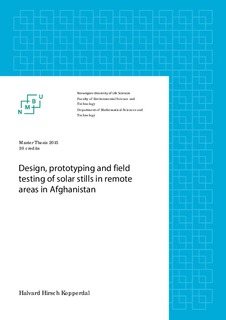| dc.description.abstract | The groundwater in the Faryab province in Afghanistan is the main source of drinking
water for the local people and is of low quality. They are currently drinking water with
high concentrations of salt and contamination, which can be a severe health risk [6]. Due
to fragmented strategies and policies in Afghanistan it is reason to believe that problems
related to drinking water access and quality will increase for the future generations.
This study is based on the master thesis “Desalination of groundwater by solar stills -
field trials in Afghanistan” conducted by Cecile Kolstad spring 2014 and a pre project
during autumn 2014. Throughout the current study of low cost solar stills for households
in the Faryab province, a design, prototype and testing is carried out in collaboration with
NCA Afghanistan and Norplan.
To develop knowledge and technology that is unfamiliar for the afghan people is
challenging related to technicalities such as material selection and manufacturing
methods. In addition, challenges regarding social acceptance, cultural differences and
safety issues make the technology implementation even more complex.
A product development process to optimize a single basin solar still with respect to
design and cost has been performed. This included an extensive introduction to solar
still principles and thermodynamics, with a following product development process
where important design parameters, local materials and manufacturing methods were
included and resulted in a preliminary design. Then, a prototype was manufactured and
tested during a three week field trip to Kabul, Afghanistan.
The prototype structure is made of galvanized iron sheets, insulated with expanded
polystyrene and a basin material of 1 [m2] glass. The prototype cost is 158 [USD] and an
estimated series production cost for 50 units brings the cost down to 90 [USD], which is
below the product cost requirement set by NCA and Norplan.
Testing has been performed in good conditions at the NCA office in Kabul for three days
and preliminary results shows a yield of approximately 1.9 [L/m2/day] which is nearly 2
[L] lower than expected. More tests must be performed to be able to conclude and
obtain statistical safety in the test results. The low production rate may be a
consequence of air leakages or the low solar absorptivity of the glass basin. On the
other hand, a yield of 1.9 [L/m2/day] would provide one person with approximately 400
[L] of safe drinking water throughout the spring, summer and autumn.
There is concern regarding the choice of basin material and the low correlation between
manufactured design and provided drawings, which may have resulted in a reduced still
efficiency. In addition, no water quality analyses have been performed to verify the
quality of the distillated water, which must be done when there is certainty in the
production rates.
I Faryab-provinsen i Afghanistan er grunnvannet hovedkilde til drikkevann for lokalbefolkningen.
Dette er av dårlig kvalitet, og inneholder høye konsentrasjoner av salt og
forurensninger, noe som kan være svært helseskadelig [6]. På grunn av uforutsigbare
reguleringer og en urolig politisk situasjon er det grunnlag for å tro at problemer tilknyttet
kvalitet og tilgang på drikkevann vil øke for kommende generasjoner i Afghanistan.
Dette prosjektet er basert på masteroppgaven “Desalination of groundwater by solar
stills - field trials in Afghanistan” av Cecile Kolstad våren 2014, og et forprosjekt høsten
2014. Denne oppgaven omhandler utviklingen av rimelige solar stills for avsalting av
drikkevann til privathusholdninger i Faryab-provinsen, og design, prototype og tester er
utført i samarbeid med Kirkens Nødhjelp og Norplan.
Å drive teknologisk utvikling og kunnskapsformidling i Afghanistan er utfordrende
teknisk, i forhold til for eksempel materialvalg og fabrikasjon. I tillegg gjør kulturforskjell,
sosial aksept og sikkerhetssituasjonen teknologi-implementeringen enda mer komplisert.
Det er utført en optimalisering av en solar still med ett basseng, med hensyn til design
og kostnadsreduksjon. Prosessen startet med studier av varmeoverføring innad og utad
i enheten. En påfølgende produktutviklingsprosess, hvor viktige design-parametere,
lokale materialer og fabrikasjonsmetoder ble inkludert, resulterte i et design. Deretter ble
en prototype fabrikkert under et tre uker langt feltarbeid i Kabul, Afghanistan.
Rammen i prototypen er laget i galvaniserte stålplater og er isolert med isopor.
Bassenget er på 1 [m2] og av 6 [mm] glass. Prototypen kostet 158 [USD] og estimert
kostnad ved serieproduksjon av 50 enheter senker prisen til 90 [USD], noe som er
lavere enn kostnadskravet til produktet satt av Kirkens Nødhjelp og Norplan.
Testing er utført i tre dager ved kontoret til Kirkens Nødhjelp i Kabul, og de foreløpige
resultatene viser en produksjon på 1.9 [L/m2/dag], noe som er ca. 2 [L] lavere enn
forventet. Det må foretas flere tester før en kan konkludere og ha statistisk sikkerhet i
resultatene. Den lave produksjonen kan være en konsekvens av lekkasjer eller at glassbassenget
har lav evne til å absorbere solenergi. Likevel kan en produksjonskapasitet
på 1.9 [L/m2/dag] livnære en person med trygt drikkevann, omtrent 400 [L], gjennom
våren, sommeren og høsten.
Den lave virkningsgraden kan skyldes valg av bassengmateriale og de store avvikene
mellom tekniske tegninger og fabrikkert design. Det er ikke utført vannprøver for å
verifisere kvaliteten av det destillerte vannet. Dette må gjøres etter at flere tester av
produksjonskapasitet er utført og det er oppnådd pålitelige resultater. | nb_NO |
